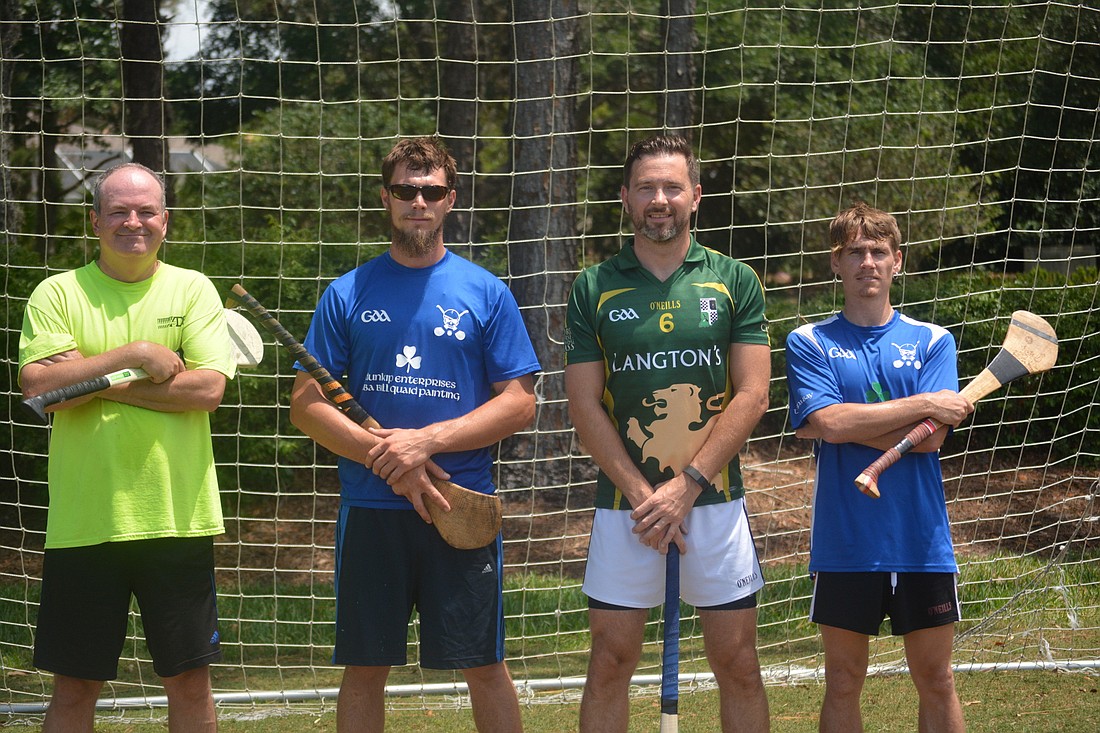- November 24, 2024
-
-
Loading

Loading

It’s called the fastest game on grass, and unless you have Irish blood, chances are you’ve never heard of it.
Hurling hasn’t really caught on in the United States, possibly due to the nauseating stateside connotation of its name. But in its native Ireland, far from America’s frat-boy slang, hurling is played in front of packed stadiums, as it has been for more than 3,000 years. The game, brought to the island by Celtic tribes, actually out dates the formation of Ireland and, possibly, Christianity.
Although rare, the sport does have American supporters, including in Lakewood Ranch.
John Hanlon, Austin Rushnell, Tim Boyll and Zack Mozina are members of the Tampa Bay Hurling Club. The “Tampa Bay” aspect of the name simply signifies the club’s general region. Hanlon, Rushnell and Mozina live in Lakewood Ranch, while Boyll resides in Tampa. The club practices each weekend, typically at Lakewood Ranch High or a neighboring park, and holds matches about once a month, playing three or four teams in one day.
In case you are curious about what this mystery sport looks and feels like, here’s a quick primer:
Hurling players use a stick, naturally called a hurley, to pass, shoot and defend. The ball is called the sliotar, which looks like a baseball but is made of cork and therefore lighter. Players are allowed to possess the sliotar for four steps before passing or shooting on goal, one of the reasons it’s played at a faster pace than lacrosse, soccer or hockey. Giving the sliotar a good whack can send it flying 50-80 yards in the air, Hanlon said. In Ireland, hurling matches are played 15-on-15, but Tampa Bay plays 7-on-7 because of space restrictions. The only mandatory protection hurling players wear are helmets. Shin pads are optional. The game is commonly called a “bastion of humility,” with no player names on the backs of jerseys, and numbers assigned by position.
Hanlon helped start the club about 10 years ago. His parents were of Irish descent, and he grew up playing the game. Rushnell, who is conversationally fluent in Gaelic, discovered the game three years ago while getting his master’s degree in Irish history overseas. Once back in the United States, he wanted to continue his newfound hurling passion — and found the club on Google.
Mozina spotted it being played, decided to try it and loved it. He was tired of mainstream sports, he said, and he finally found something exotic.
Others, Boyll said, are looking to connect with their Irish heritage. The club accommodates this, always respectful to the game’s origins. When the club hosts its Florida Cup each fall, traditional Irish music is played, and sometimes an Irish step dancer is hired to add atmosphere. Once, prior to a match in Ohio, the club was blessed by an Irish priest.
Hurling is also a social sport. The team always goes out for drinks after practice. Guinness and Jameson are common drink orders. When the team travels for a big tournament (usually once or twice a year), things can get rowdy. The club went to New Orleans on one such occasion in September, using Airbnb to stay in the French Quarter. Hurricanes were consumed, and fun was had, but the team declined to elaborate.
“We don’t really talk about that (trip),” Mozina said, as the others laughed and agreed.
The Gaelic Athletic Association oversees every hurling team in the world, even Tampa Bay. Like Hanlon and the rest of the club, all hurling players in Ireland are amateurs. No one is paid to play the sport, not even in the All-Ireland Senior Championship, more or less the Irish version of the NFL or NBA.
“It’s turned me off from professional sports,” Boyll said of playing hurling. He’s tired of the “me-first” attitudes often seen in those athletes, preferring a team-oriented aura, he said. A GAA logo on a shirt or jersey acts as something of a common bond between strangers, with Boyll calling it a secret society.
It’s a welcoming one, though, with the group always open to new members. Whether someone is looking for exercise, a new experience or a group of drinking buddies, he could just find his new favorite sport he has never heard of.